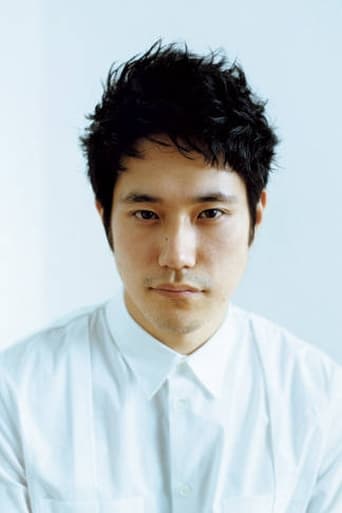Jacomedi
A Surprisingly Unforgettable Movie!
Hadrina
The movie's neither hopeful in contrived ways, nor hopeless in different contrived ways. Somehow it manages to be wonderful
Ava-Grace Willis
Story: It's very simple but honestly that is fine.
Lela
The tone of this movie is interesting -- the stakes are both dramatic and high, but it's balanced with a lot of fun, tongue and cheek dialogue.
Tom Gooderson-A'Court
Set in 1960s Japan, Norwegian Wood is a film about depression, loss and sexuality. After his best friend Kizuki commits suicide aged 17, Watanabe (Ken-ichi Matsuyama) moves to Tokyo and enrols at University in an attempt to escape the depressing nature of his home town. By chance one day he meets his dead friend's ex-girlfriend Naoko (Rinko Kikuchi) and the two begin a loving but strained relationship. Naoko has never truly got over the death of Kizuki and one day disappears, eventually turning up in a sanatorium deep in the forest. Watanabe tries to maintain both a friendly and sexual relationship with the depressed Naoko but this is made difficult by her mental state and the introduction of the outgoing and self confident Midori (Kiko Mizuhara) who vies for Watanabe's affections.The film features some quite stunning cinematography and beautifully shot landscapes. This was great because the actual story was quite depressing and boring. I never really got on board with any of the characters and felt distanced from them. Watanabe is a man who is deeply in love and trying to do the right thing but at the same time living through a sexually adventurous age and wants to have something from both worlds. Naoko was a very loving but deeply disturbed character and the two of them spent most of the film staring into nothingness or out across beautiful vistas. It kind of felt like a two hour long perfume advert. Another thing it reminded me of is the sort of French tragic-dramas that go down so well with critics but are seen by about six people, all of whom hate it. I think you have to get on board fairly early on with this film and I just didn't.Along with the fantastic cinematography the film also features some great prog-rock and psychedelic music from the period which works really well. The score is also excellent and was composed by Radiohead guitarist Jonny Greenwood. The great Beatles song Norwegian Wood from which the source material got its name is also used.On the whole the film is incredibly beautiful but feels allusive and distant. Thematically it is sound and aesthetically it works but it is overly long and too dull.www.attheback.blogspot.com
IrohaUta
Disappointing... Tran Anh Hung took off all the lightness and funny parts of the book (Reiko is so plain, guitar playing scene made cheesy), only to illustrate the angst of the characters, i.e, with looong shots of them yelling, drooling, crying over beautiful landscapes sceneries. And had I not read the book, the story would have seem to me like a classic cliché three-sided love with dull soppy moments (The amount of "I love you" scenes) . Plus, for once, Hung focused too much on the sexual aspect of the relationships, the scenes are indeed sensual, but it gets tiring after a while. Tran Anh Hung's hand immediately recognizable and what bothers me is that it seems to be exaggerated on purpose. "Let's make him cry with some flashbacks of her, and let's put long shots of waves crushing rocks to show the internal turmoil inside him, in case the yelling/drooling/unshaved look wasn't enough". Beautiful, subtle, yeah. Shallow, over-melodramatic, vapid and gloomy, hell yeah !
Howard Schumann
The poet Rilke said, "There is only one journey. Going inside yourself. Here something blooms; from out of a silent crevice an unknowing weed emerges singing into existence." The unknowing weed takes its time to sing but sing it does in director Tran Anh Hung's film Norwegian Wood, his first since Vertical Ray of the Sun in 2000. Based on the best-selling 1987 novel of Haruki Murikami (which I haven't read), the film reflects the inner journey of 19-year-old Toru Watanabe (Ken'ichi Matsuyama), a journey that embodies the pain of love and loss, the tantalizing embrace of death, the end of dreams, and the beginning of adult responsibility.Scored by Jonny Greenwood with some narration by Watanabe, the film takes place in Tokyo in 1967 in the midst of student protests against the War in Vietnam. Trying to ease the pain of the shattering loss of Kizuki (Kengo Kora), a close friend from high school, Watanabe immerses himself in his studies at school where he is majoring in drama and, with Nagasawa (Tetsuji Tamayama), an older and more experienced friend, is able to release his tension by going to bars and picking up girls for sex. Things change, however, when Kizuki's former girlfriend, the beautiful but emotionally fragile Naoko (Rinko Kikuchi), shows up in Tokyo and reaches out to Watanabe for consolation. Though their language is exceedingly frank and sexually explicit, it is vital to understanding the characters and never used to titillate.Their deepening relationship, however, only brings the feelings of loss closer to the surface and Naoko's ensuing emotional breakdown causes her to leave Tokyo for psychological rehabilitation at a mountain retreat where she is only able to see Watanabe intermittently. Even on occasional meetings, however, they embrace a dark ecstasy that inures them, at least temporarily, from their mutual grief, but when Naoko's roommate, music teacher Reiko (Reika Kirishima), sings the Lennon and McCartney song "Norwegian Wood" at Naoko's 20th birthday party, the line "and when I awoke, I was alone, this bird had flown," evokes tears that flow naturally.Paralyzed by her sadness and feelings of responsibility for Kizuki's death, Naoko sinks deeper into despair and Watanabe's vows of lifelong fidelity are compromised by his attraction to Midori (Kiko Mizuhara), a smart, outgoing student who also has had to overcome a troubled past. Norwegian Wood is not a film about "teenage angst," or any other of the favorite catch phrases that substitute for empathy, but about the essence of life itself and the anguish of having to let go of attachments. More of a tone poem than a free-flowing narrative, the film creates an indelible experience of both exquisite beauty and aching pain, perhaps two sides of the same coin. Like the under-appreciated Tony Takitani, another film based on a story by Murakami, Norwegian Wood unfolds like a dream, evoking a mood of serenity and contemplation.Supported by the stunning cinematography of Ping Bin Lee, much of the film's power takes place in the silences that allow us to simply observe the sublime beauty of the countryside, its forests, waterfalls, and the purity of its winter landscapes. While some may try, the film's emotional roller coaster cannot be filtered out and, in the process of assimilating it, it builds a quiet power that ensnares us and leaves us to explore its meanings long after the final credits. In spite of those who want to attach the label of "boring" to every film that moves slowly and requires concentration, Norwegian Wood will be remembered as one of Hung's best films and a work that brought cinema to a new level of artistic achievement.
tha-13
This pretentious movie is beyond art-house-cinema at its worst, because it isn't art. Because it has no touch what so ever with human emotions it is unbearable to watch, and you cannot help feeling, that it must all of sudden turn into a comedy - but unfortunately it does not. It wants to be a movie about sexuality and loss, but since it is made by the mind of a materialist it looks and feels like a series of scenes with abused young actors in a bad commercial for a dress-label and a Russian vodka. It wants to show off and take an existential view on the important and always vivid subject of coming-of-age, but the level of wisdom and spiritual depth is perhaps the most shallow, I have seen since "plan 9 from outer space". Watch Bille August "Zappa" or Jacob Aron Estes' "Mean creek" instead.




